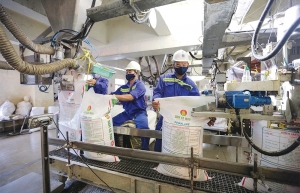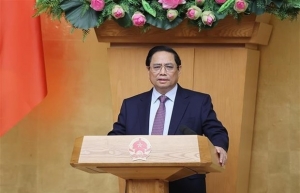VAT cut continuation expected to ease woes
The government last week submitted a report to the National Assembly (NA) on maintaining the VAT rate at 8 per cent, but also extending it to cover all items in the economy until at least the end of the year.
 |
| The VAT rate of 8 per cent could be extended to apply to new areas, photo Le Toan |
Expected to be passed this month and take effect on July 1, this proposal has received the thumbs-up from many NA deputies, who said that the policy will help enterprises lower their difficulties and improve their competitiveness.
Deputy Nguyen Ngoc Son, representing the northern province of Hai Duong, stated that domestic consumption is increasing at a very slow pace, and it needs to be promoted.
“The NA should soon set out a clear roadmap for the VAT reduction for a long enough period, at least a year, so that the effectiveness of demand stimulation can be ensured,” Son said.
The policy to drop the 10 per cent VAT rate to 8 per cent has only been re-applied for periods of approximately six months, and first came into effect in February 2022.
“At present, all indexes related to public debts remain at a low and safe level. It is suggested that the NA and the government soon consider policies on exempting, extending, and reducing assorted taxes and fees for the public and enterprises as they have been doing since 2022,” said NA deputy Tran Thi Hong Thanh, representing the northern province of Ninh Binh.
“This will also need to include a 2 per cent VAT reduction until at least the end of 2024; and a decrease for registration fees for domestically manufactured automobiles. This will help boost consumption and increase sale revenues, then helping to increase tax revenues,” Thanh added.
In November 2023, the NA, for the third time, passed a resolution which embraced a VAT decrease of 2 per cent until late June 2024 for goods and services subject to a 10 per cent rate, with a view to “contributing to reducing prices of goods and services to fuel production and business activities, generating more employment.”
The existing application of an 8 per cent VAT rate is not applied to many goods and services such as telecommunications, IT, financial activities, banking activities, securities, insurance, trading of real estate, metals, precast metal products, mining products (excluding coal mining), coke mining, refined oil, chemical products, and goods and services subject to excise taxes.
The Supervision Team of the NA told the legislature that the VAT decreases since 2022, together with other measures on fee and tax assistance for businesses and the public, have been helping them to save production costs and raise profits, while also helping expand domestic consumption.
It is reported that total VAT reduction in 2022 reached $1.85 billion in 2022 and about nearly $2 billion last year.
The Ministry of Finance (MoF) reported that in 2023, the total values of all policies on exempting, reducing, and extending payment of assorted taxes, fees, and charges, as well as rental for land and water surface reached about $8.33 billion, including exemption and reduction of $3.3 billion and extension of $5.04 billion.
Last year, extending payment of VAT, corporate income tax, personal income tax, and land rental led to a reduction in the state budget revenue of an estimated sum of as much as $4.58 billion.
“The 2 per cent VAT reduction has had direct and positive impacts on people’s life and businesses’ performance, then helping to decrease prices of products which include the majority of indispensable consumer goods. This also helped ensure social security,” said NA deputy Duong Khac Mai, representing the Central Highlands province of Dak Nong.
The government has announced that until at least the end of 2024, it will provide more practical support in a fiscal policy for the public and businesses. This support, estimated to be valued at around $4.08 billion, also includes a 2 per cent reduction of VAT. The State Bank of Vietnam will also increase the preferential credit package’s value for the forestry and fishery sector to $1.25 billion, and it is also formulating a similar package for the rice sector.
At present, the MoF is conducting a comprehensive review on the government’s policies on extending and reducing a number of taxes and fees for enterprises and the public applied since 2022, before deciding on new similar solutions. The taxes reviewed and to be extended in payment include VAT currently applied at a rate of 8 per cent, corporate income tax, personal income tax, and special consumption tax for domestically-produced automobiles.
The fees reviewed and to be reduced consist of registration fees for domestically-produced and domestically-assembled automobiles; and reduction of rental for land and water surface.
| Le Minh Khai, deputy Prime Minister
Many NA deputies are saying that enterprises are now facing great difficulties, and the government will continue exempting and reducing taxes, fees, charges, and land rental to help businesses out of difficulties. The total value of fiscal support for the economy reached $29.3 billion during 2020 and 2023. The government also asked the NA to approve the continued reduction of taxes in the first six months of 2024, and is also doing the same for the second half of the year. If the tax reduction and exemption policy is adopted by the NA for the second half of 2024, the total value will be $1 billion, meaning $7.91 billion for the whole year – including extension of $3.83 billion and exemption and reduction covering the remainder. Many NA deputies have also assessed the Programme on Socioeconomic Recovery and Development for 2022-2023, which has made many achievements. However, some issues would need to be solved. For example, the $1.66 billion credit package implemented through a 2 per cent lending rate reduction has been unsuccessful. The government has reported fully the implementation of this package to the NA. |
| Currently, the average VAT rate is 12 per cent in Asia, 14 per cent in Latin America, 16 per cent in Africa, 19 per cent in the nations of the Organisation for Economic Co-operation and Development, and 22 per cent in the EU. The current global average VAT rate is 15 per cent. This comparison shows that Vietnam has room to increase VAT rates in the future, especially in the context of the country needing to expand its revenue bases. Some countries, including those in the Southeast Asian region, have been increasing VAT rates as a solution to improve budget revenue collection efficiency. Indonesia raised the VAT rate from 10 to 11 per cent in April 2022. Singapore followed suit under a two-year roadmap, from 7 to 8 per cent in January 2023 and 9 per cent in January 2024. Vietnam’s tax system reform strategy towards 2030 has also identified the orientation of considering an increase in VAT rates according to roadmaps. This orientation is consistent with the general trend of the region and wider world, and with the current state budget needs of Vietnam. Therefore, it is recommended that the government evaluate the impact of a number of VAT rate increase options according to the roadmap so that it can consider the possibility of stipulating an increase roadmap in the revised law on VAT appropriately, possibly by the end of the decade. Source: National Assembly Finance and Budget Committee |
| Fiscal policy is disciplined and a follows a conservative approach, with a view on its impact over the medium- to long-term horizon. Fiscal consolidation is undertaken gradually and prudently, as reflected in the phasing out of pandemic-related measures and transitioning to more targeted policies while considering their implications on economic recovery. Public debt has decreased to 35 per cent of GDP, supported by an improved fiscal balance and strong nominal GDP growth. Government-guaranteed debt continues to decrease as more state-owned enterprises gain access to market financing without government guarantees. To mitigate the risks of potential economic slowdown, fiscal policy will play a counter-cyclical role through more expansionary measures, aligning with monetary policy. There is ample room for additional fiscal support if circumstances require it, given the successful prior fiscal consolidation efforts and debt reduction.The fiscal position has improved, and there is considerable room to utilise debt securities. Current public debt (including debt of affiliated institutions guaranteed by the government) remains below the NA’s 50 per cent debt threshold. Nonetheless, the authorities will exercise prudence and opt for a conservative approach, considering the variability in revenue collection. The authorities are confident that the expenditure measures in 2023 will support demand. Public wages have been raised by 20.8 per cent after being frozen since 2019, with a well-contained budget impact. Efforts to better target and expand social safety nets continue, particularly focusing on the most vulnerable groups, with technical assistance from the International Monetary Fund and the World Bank. Initiatives to expedite the realisation of public investments are alsoongoing, to be accomplished through enhanced capacity of implementing officials and streamlined bureaucracy while upholding good governance practices. Source: International Monetary Fund |
 | VAT overhaul to boost agriculture prospects Vietnam is set to revise its existing Law on Value-Added Tax with a reclassification of products in areas like agriculture and fisheries, with the hopes of making them more favourable in performance. |
 | Current VAT rate may remain for foreseeable future The government is to ask the National Assembly to continue with its current VAT rate of 8 per cent until the year’s end as part of the country’s efforts to assist enterprises currently facing operating obstacles. |
 | Still no VAT hike proposal to aid business development The amended VAT Law is set to be submitted for approval next month with new content, yet the common tax rate is still proposed at 10 per cent to help businesses through current turbulent times. |
What the stars mean:
★ Poor ★ ★ Promising ★★★ Good ★★★★ Very good ★★★★★ Exceptional
 Tag:
Tag:
Related Contents
Latest News
More News
- Raised ties reaffirm strategic trust (February 20, 2026 | 14:06)
- Sustained growth can translate into income gains (February 19, 2026 | 18:55)
- The vision to maintain a stable monetary policy (February 19, 2026 | 08:50)
- Banking sector faces data governance hurdles in AI transition (February 19, 2026 | 08:00)
- AI leading to shift in banking roles (February 18, 2026 | 19:54)
- Digital banking enters season of transformation (February 16, 2026 | 09:00)
- IFC to grant $150 million loan package for VPBank (February 13, 2026 | 09:00)
- Nam A Bank forms position as strategic member at VIFC through three key partnerships (February 12, 2026 | 16:39)
- Banks bolster risk buffers to safeguard asset quality amid credit expansion (February 12, 2026 | 11:00)
- VNPAY and NAPAS deepen cooperation on digital payments (February 11, 2026 | 18:21)


















 Mobile Version
Mobile Version